上海版牛津英语8AM1U3
牛津上海版英语八年级上册 Unit3 重点词组及词性转换
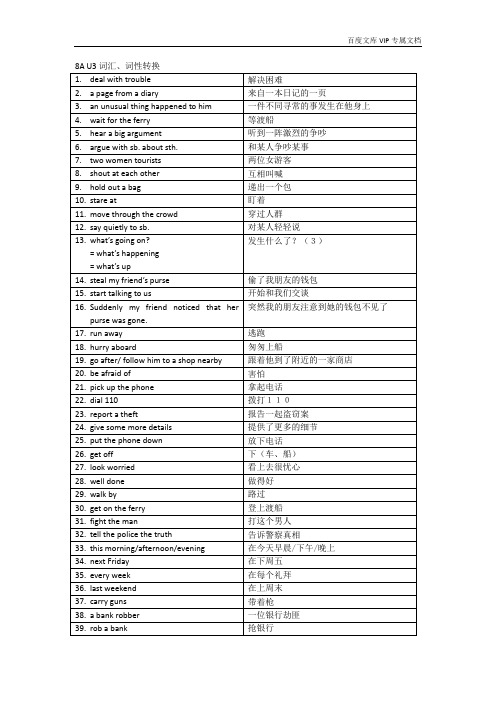
8AU3词汇、词性转换
1.deal with trouble
解决困难
2.a page from a diary
来自一本日记的一页
3.an unusual thing happened to him
一件不同寻常的事发生在他身上
4.wait for the ferry
等渡船
5.hear a big argument
听到一阵激烈的争吵
6.argue with sb. about sth.
和某人争吵某事
7.two women tourists
两位女游客
8.shout at each other
互相叫喊
9.hold out a bag
递出一个包
10.stare at
盯着
51.as soon as
一…就…
52.smuggle some rare birds
走私一些珍稀的鸟类
53.go through customs
过海关
54.work as a teller
做一名出纳员
55.get off at the wrong bus stop
在错误的公交车站下车
1.argue (v.)
逮捕/释放一名小偷
47.admit doing
承认做过某事
48.admit one’s mistake(s)
承认某人的错误
49.give him the sweater for his birthday
给他毛衣作为生日礼物
50.on the front/ back of an envelope
在信封的正面/反面
沪教牛津版-英语-八上-课件:8A Unit 3 computers words

car 这个年轻人正在向他的朋友们卖车。
popular adj.受欢迎的
This type of computers are more popular than that one.
这款电脑比那台受欢迎。
5. We shouldn’t ___d_e_p_e_n_d__(依靠)too much on our parents.
6. This mobile phone is very e_x_p_e_n_s_iv_e___. 7. What is the p_r_ic_e_____of this CD player? 8. Miss Li is very p_o_p_u_la_r_____with his
order
n. 〔C〕 订货, 订购 短语:place an order 下一个订单 He placed an order for ten computers. 他下了一个订单订购十台电脑。 May I __t_a_k_e_your order now? 我可以为你点菜了吗?
n. 〔U〕秩序 短语:keep order 维持秩序 in good order 整齐 in bad order 不整齐 n. 〔C〕命令 Soldiers should obey the orders. 士兵应该遵从命令。
ll
sell –sold-sold v. 出售 We sold 10 computers of this type
yesterday. 昨天我们卖出了十台这种类型的电脑。 sell sth to sb / sell sb sth.把某物卖给某人 The young man is selling his car to his
上海版牛津英语8AM1U3

8A Module 1 My LifeUnit 3 TroubleThe First Period ReadingLanguage Targets:ing the simple past tense to write a diary.ing the adverbs of frequency to describe the action..ing formulaic expressions to organize a diary.4.Learners can know how to help others in an indirect way.Language focus:1. V ocabulary:1) deal, trouble, argument, crowd, steal, hurry, afraid, ever, unusual, purse, quietly2) deal with, wait for, shout at, move through the crowd, stare at, hurry aboard,happen to, hold out, be going on2. Function: They stole my friend’s purse five minutes ago.Teaching aids:1. A recorder, a cassette2. Student’s book 8A page 39.Teaching steps:Second Period Grammar A Language Targets:1. Practise the simple past tense and adverbial expression.2. Students can use the simple past tense correctly.Language focus:1. V ocabulary: jump over a stream, blow down your tents, carry guns2. Forms of the simple past tense of irregular verbs.Teaching aids:1. A recorder, a cassette,2. Students’book 8A page 42Teaching steps:Third Period Grammar BLanguage Targets:1.To use the adverbial phrases of time with the simple past tense to show whensomething happened.2.Students can use the simple past tense correctly.Language focus:1. V ocabulary: jump over a stream, blow down your tents, carry guns2. Forms of the simple past tense of irregular verbs.Teaching aids:1. A recorder, a cassette,2. Students’book 8A page 43Teaching steps:Fourth Period Listening Language Targets:1. To learn to catch the main information you need while listening.2.To describe a person’s appearance correctly. Language focus:1.V ocabulary: description, rather, baseball2. Functions: It was black and brown in color..He had quite long hair.Teaching aids:1. A recorder, a cassette,2. Students’book 8A page 45Teaching steps:The Fifth Period Speaking Language Targets:1. Learn three pronunciations related to the past tense forms of verbs.2. Be able to say the sentences with correct intonation .3. Introduce a historical figure usinthe grammar learnt in this unit. Language focus and difficult points:1. Three different ways of pronouncing the past tense forms of verbs.2. Vocabulary: mend downstairs India press the buttonTeaching Aids:1. Student’s Book 8A page 46.2. Multi-mediaThe Sixth Period Writing Language Targets:1. To finish Judy’s diary by using correct verbs and other words.2. To use the simple past tense to write a diary.3. To express their own ideas in English fluently. Language focus and difficult points:1.The simple present tense.2. Vocabulary: helicopter, out of, up to, climb up Teaching Aids:1. Student’s Book 8A page 472. Multi-mediaThe Seventh Period More PracticeLanguage Targets:1. To learn some funny side of police work.2. To be able to collect information and find the imformation about funny side of police work. around you.3.To express their ideas in English fluently.Language focus and difficult points:V ocabulary: admit, arrest, case, customs, rare, refund, release, smuggle, teller Teaching Aids:1. Student’s Book 8A page482. Multi-media。
沪教牛津版8AU3-1 Reading

flying planes and spaceships
While-reading
Studying:
01 do homework, read
news...
Communicating:
02 QQ, Wechat...
What else can you do with computers?
Relaxing:
No, it isn’t. Because the human brain can produce new ideas but computers cannot.
4 Computers are expensive.
Before you read: P35
sub-headings
A sub-heading usually tells us the topic of the paragraph below it.
Before you read:P34
Look at the pictures, the title and the sub-headings of the article on page 35. Then tick (✓) the facts that the article probably talks.
__b_ig_g_e_r_t_h_a_n__cars
Development Becoming _s_m_a_l_le_r__a_n_d_b_e_t_t_e_r
Computers nowadays
Example
There is probably one inside your TV or washing machine.
Unit 3 Computers Reading: Computer facts
牛津上海版8AUnit3基础学案

牛津上海版8A U3本单元重点单词梳理1. trouble n(l) 麻烦e.g. Tom never makes any trouble at school. 汤姆在学校从不惹麻烦。
(2)困难;困境e.g. We got in trouble when the car broke down in a storm.车子在暴风雨中坏了,我们陷入了困境。
【知识拓展】trouble v.(l)麻烦:烦扰;请求。
e.g. Could I trouble you for the time? (=What time is it?) 打扰了,请问现在几点了?(2)使烦恼,使苦恼。
e.g. What's troubling you? 你因何事而烦恼?【例题】Don't bring Mr Wang__________. He is too tired.A. too much troubleB. so many troublesC. much too troubleD. so more troubles【答案】 A2. happen v.出现,发生e.g.What happened next, Jim? 后来怎么啦,吉姆?【常用搭配】(1) happen to sb./sth.成为某人(事)的体验或命运;降临到某人(事)的头上e.g. What's happened to my feet? They hurt badly!我的脚怎么了?很疼呀!(2) happen to be/do恰巧,碰巧e.g. Mary happened to be there when I went into the kitchen.=It happened that Mary was there when l went into the kitchen.当我进厨房的时候,恰巧玛莉在那。
【指点迷津:happen,take place】happen和take place都表示“发生”,二者都不能用于被动语态,happen强调偶然性,而take place则强调必然性或计划性。
牛津上海英语八年级上册 Unit3 (共15张PPT)

Then I _m_o_v_e_d__th_r_o_u_g_h_the crowd and asked what had
htharpepeemneadn._sF_tr_oo_mle__thtehewopmuresne’.s
words, I learnt When the ferry
that one of arrived,the
Read Paul’s diary and answer questions:
• What was the trouble?
A theft. • When did it happen? When Paul and his dad were waiting for the ferry. On Friday,June 28th • Who was in the story?
是 您 ,开 学 第 一天向 我们伸 出温暖 的手臂 ,从此 ,我们便 跟着您 茁壮成 长; 是 您 ,在 快 乐 的课堂 上,带 领我们 走进知 识的海 洋;
是 您 ,让 我 们 认识了 “雷锋 叔叔” ,尝到 了助人 的快乐 ,领悟了 做人的 真谛; 是 您 ,在 我 们 幼小的 心灵,撒 下了 理想的 种子,给 我们引 领了生 命的航 向。 亲 爱 的 老 师 ,在我们 的心,您 永远 都是最 可敬的 人。我 们永远 都会铭 记,您的 宽容、 理 解 、 关 爱 和帮助 。在这 新年伊 始,春光 明媚的 新学期 刚刚向 我们走 来时,请 接受
Help Paul’s father finish the witness report.
When my son and I were waiting for the ferry, we heard
八年级英语上册 chapter3 reading教学设计 上海牛津版
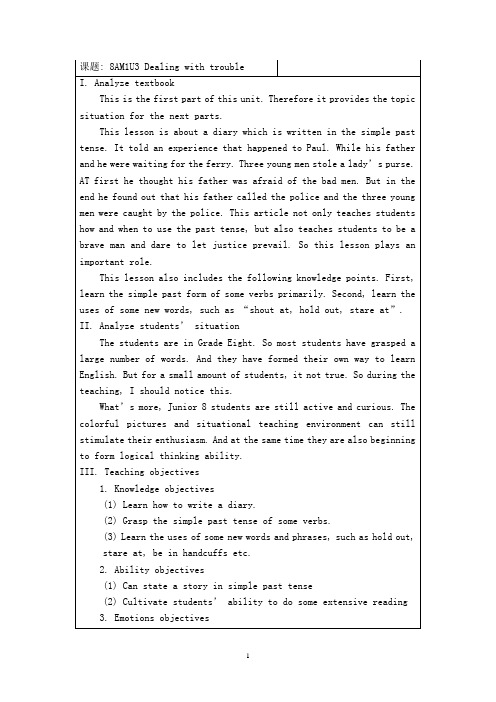
(2)Learn how to do some extensive reading,because it’s the basic ability to learn English.It’s very useful in their future study.
2.Teachingpoints
(1)The uses of words and phrases,because they’re the accumulation of knowledge.
IV.Teaching difficulties and teachingpoints
1.Teaching difficulties
(1)The past form of the verbs in this lesson,because this is the first time for students to contact the past tense,and there’s no past tense in Chinese.So it’s not easy for students to understand it.
III.Teachingobjectives
1. Knowledgeobjectives
上海牛津英语8AU1-U3测试题
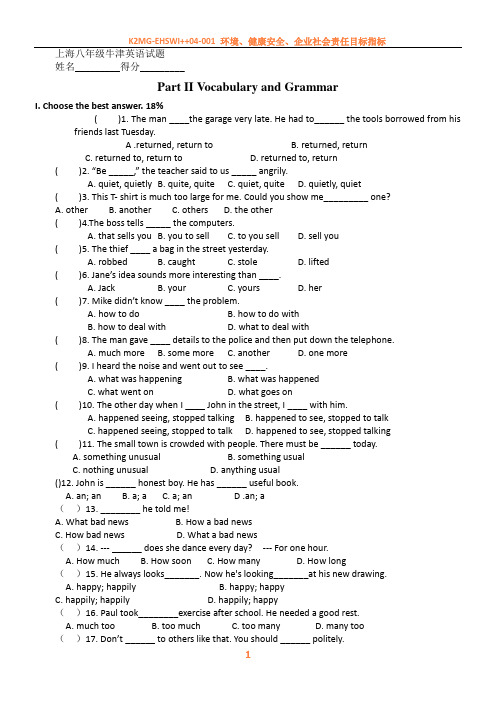
上海八年级牛津英语试题姓名_________得分_________Part II Vocabulary and GrammarI. Choose the best answer. 18%( )1. The man ____the garage very late. He had to______ the tools borrowed from his friends last Tuesday.A .returned, return to B. returned, returnC. returned to, return toD. returned to, return( )2. “Be _____,” the teacher said to us _____ angrily.A. quiet, quietlyB. quite, quiteC. quiet, quiteD. quietly, quiet( )3. This T- shirt is much too large for me. Could you show me_________ one?A. otherB. anotherC. othersD. the other( )4.The boss tells _____ the computers.A. that sells youB. you to sellC. to you sellD. sell you( )5. The thief ____ a bag in the street yesterday.A. robbedB. caughtC. stoleD. lifted( )6. Jane’s idea sounds more interesting than ____.A. JackB. yourC. yoursD. her( )7. Mike didn’t know ____ the problem.A. how to doB. how to do withB. how to deal with D. what to deal with( )8. The man gave ____ details to the police and then put down the telephone.A. much moreB. some moreC. anotherD. one more( )9. I heard the noise and went out to see ____.A. what was happeningB. what was happenedC. what went onD. what goes on( )10. The other day when I ____ John in the street, I ____ with him.A. happened seeing, stopped talkingB. happened to see, stopped to talkC. happened seeing, stopped to talkD. happened to see, stopped talking( )11. The small town is crowded with people. There must be ______ today.A. something unusualB. something usualC. nothing unusualD. anything usual()12. John is ______ honest boy. He has ______ useful book.A. an; anB. a; aC. a; an D .an; a()13. ________ he told me!A. What bad newsB. How a bad newsC. How bad newsD. What a bad news()14. --- ______ does she dance every day? --- For one hour.A. How muchB. How soonC. How manyD. How long()15. He always looks_______. Now he's looking_______at his new drawing.A. happy; happilyB. happy; happyC. happily; happilyD. happily; happy()16. Paul took________exercise after school. He needed a good rest.A. much tooB. too muchC. too manyD. many too()17. Don’t ______ to others like that. You should ______ politely.A. say; speakB. speak; tellC. say; talkD. talk; speak()18. It ______ me about 25 minutes to get to the railway station yesterday.A. spentB. costedC. tookD. paid()19. John arrived _____ London _____ a cold morning.A. on; atB. at; atC. in; onD. at; in()20.She plays_________piano every day.A.aB. anC.theD./()21.______his way to school,David helped an old man.A.InB.OnC.ForD.From()22.Father asked me ________go out at night alone.A.don’tB.notC.not toD.not to do()23.The man_________his goal in the end,he finished the job.A.tookB.makeC.achievedD.played()24.He says he will deal_________ the problem next week.A.forB. withC.toD.at()25.She lost her car so she__________110.A.dialsB.dialingC.dialedD.dial()26.The soldiers walked__________the forest.A.alongB.crossC.acrossD.through()27.Someone noticed James_________the Bank of China.A.enterB.to enterC.entered Dhas enter()28.It is not _________to shout at others.A.politelyB.rudeC.politeD.instereting()29.Sally happened________his classmate in the street.A.to meetB.meetC.meetingD.met()30.I’ve got the first prize in the game.A.That’s all rightB.Well doneC.Thank youD.You’re welcome.II. Complete the sentence with the given words in their proper forms: 6%1. Jenny reported a ___________ to the police, she is a brave girl. (thief)2. Trees are great ____________ against pollution. (fight)3. Tell you __________, he is really an honest man. (true)4. Mike got up late this morning, so he __________ to school without breakfast. (hurry)5. The teacher repeated the ___________ of the story, but I still couldn’t understand it. (explain)6. All of us hope our school will be _______________ in celebrating the School Day. (success)7.—Whose are these bags? —they’re the ____________ (boy).8.I like Home Economics because I’m_____________ (interest) in it.st night, she _________ (hurt) her arm badly.10.Jim ____________ (join) fewer clybs than John did.11.As we all know, light ______________(travel) faster than sound.12.Be quiet! The baby ______________(sleep) in the next room.13.What about _____________ (play) football?14.Those houses are on___________(sale),you can go and have a look.15.____________(luck),he caught the bus at last.16.The boy got___________(bore) at the meeting.17.Everyone wants to be a______________(success)man.18.I visits my grandparents_____________(two)a month.19.My friend,Tom ,was_____________(bear)in 1990.20.Please___________your letter at the beginning of the meeting(signature)III. Rewrite the sentences as required: 12%1. She often has lunch at school. (改为一般疑问句)______ she often _______ lunch at school?2. The old man read English every morning. (改为否定句)The old man ______ ______ English every morning.3. Our monitor seldom goes to school late, ______ ______? (改为反义疑问句)4. Mary sings best in her class. (保持句意不变)Nobody ______ sings as ______ as Mary in her class.5. My father will be back from Canadain a week. (对划线部分提问)______ ______ will your father be back from Canada?6. Wendy isn’t old enough to drive a car.(同义改写)Wendy is ______ ______ to drive a car.Part III Reading and WritingI. Reading comprehension: 25%( A )One day a lawyer went to get a doctor for his wife. The doctor knew that the lawyer waswell-known for no t paying bills. So he said, “If I do cure(治愈)your wife, I’m afraid you may not pay me.” “Sir,” replied the lawyer, “here’s $500. I will give you all this whether you cure my wife or kill her.” The doctor believed what he said and went into the house. When he saw her, he knew that he could do little. Although he gave her some medicine, she soon died. He said sorry to the lawyer and asked for the money which he had been promised(许诺).“Did you kill my wife?” asked the lawyer. “Of course I didn’t.” answered the doctor. “Well! Did you cure her?” “I’m afraid that it was impossible.” “Well,” cried the lawyer, “since you did not kill my wife, nor did you cure her. I’m sorry. I have nothing to pay you.”True or False(判断下列句子是否符合短文内容,符合的用“T”表示,不符合的用“F”表示): ( 5分)1. The lawyer was famous for always paying the bills in time.2. The lawyer promised to pay the doctor $500 no matter he cured her or killed her.3. … “he knew that he could do little”means the lawyer’s wife was seriously ill.4. The doctor didn’t give the lawyer’s wife any medicine, so she died soon.5. The lawyer didn’t pay anything because the doctor neither cured her nor killed her.( B )There are many types of reports. A report is simply an account of(描述) something that has happened. The most common are news reports. We get them in newspapers, over radio and on television.The main purpose of a newspaper is to supply news. If you take a close look at a newspaper, you will find that there are all types of news: accidents, floods, wars, fashions, sports books, etc. The news covers everything that happens to people and their surroundings. Sometimes there are news items which are very interesting.A news report is usually very short, except when it is about something very important, but it gives plenty of information. It is also written in short paragraphs. The first paragraph is in fact asummary(概要)of the news item. It gives all necessary information---what, when, where, how and why. The other paragraphs give full details(细节)of the subjects. There may also be interviews with people.Often there are photos to go with the news to make it more interesting.Choose the best answer(根据短文内容,选择最恰当的答案): ( 5分)1. We can get news ________.A. only in newspapersB. on TVC. in newspapers, over radio and on TVD. from many types of reports2. Most probably the writer thinks the easiest way to get today’s news is ________ .A. to listen to the music over the radioB. to watch TVC. to read today’s newspaperD. to talk with many people3. If you want to get enough information about yesterday’s flood within a short time, you’dbetter________.A.read the last paragraph of the news reportB.look through the first paragraph of the news reportC.talk with the people who saw the floodD.begin with the second paragraph of the news report4. The main purpose of a newspaper is to___________.A. give all kinds of newsB. get informationC. have pictures to go with the newsD. give a summary of the news item5. This passage mainly talk about ________.A. the length of a news reportB. different types of news reportsC. happenings to peopleD. news reports( C ). Choose the words or expressions and complete the passage(选择最恰当的单词或词语完成短文):(5分)Drea ms may be more important than sleep. Some people don’t need1 sleep. But we all need to dream, scientists say.Dreams take up about one quarter of sleeping time. People have several dreams each night. Dreams 2 short films. They come to us over and over again. That may be because the 3 is worrying about something. Dreaming 4 a way of trying to find an answer.Some people get new ideas about their work from dreams. They could have been thinking about their work all day. These thoughts can carry over into dreams.Sometimes we wake up with a good feeling from a dream. But often we can’t 5 the dream. Dreams can disappear quickly from memory.1. A. much B. many C. few D. little2. A. like B. is like C. are like D. look like3. A. man B. woman C. sleeper D. dreamer4. A. maybe B. may be C. perhaps D. may possibly5. A. remember B. forget C. feel D. talk( D ). Read the passage and fill in the blanks with proper words(在短文的空格内填入适当的词,使其内容通顺,每空格限填一词,首字母已给):(5分)Most people work or study from Monday to Friday. The weekend is usually a time of r_________.As the saying goes, "all work and no play m_______ Jack a dull boy." But today's Chinese teenagerscan hardly rest during the weekends.According to a recent survey, 24 per cent of the Junior 2 students in Beijing have classes at the weekend. Over 40 per cent of the junior students have less than eight hours’ s_________ each night because of study.And this isn't o_______ in Beijing. Ji Chunying is a Junior 3 student in Guangzhou. The 14-year-old has to get up at 6:45 a.m. on Saturday. Then she has a whole day of classes. On Sunday, she goes to extra classes for maths and physics.But Ji doesn't complain. She says her classmates all work very hard."We'll have entrance exams for senior high school (升高中考试)very s_______, just in five months." says Ji. "I'll have time to play when I grow up."( E )Before 1800, women’s only place was in the home. The idea of women in the business world was unthinkable. No “nice” woman would dream of entering what was a “man’s world”. Even if she could, what would she do? Men were sure that no woman could do a job outside her home. This was such a widely accepted(被接受的) idea. When the famous Bront sisters began writing books in 1846, they disguised (隐瞒)thems elves by signing their books with men’s names.Teaching was the first profession open to women soon after 1800. But even that was not an easy profession for women to enter because most high schools and colleges were open only to men. OberlinCollege was the first college in America to accept women.Hospital nursing became great work for women only after Florence Nightingale became famous. Because she was a rich and cultured woman, as well as a nurse, people began to believe it was possible for women to nur se the sick and still be “ladies.” Miss Nightingale opened England’s first training school for nurses in 1860.The invention of the typewriter in 1867 helped to bring women out of the home and into the business world. Because women had quick fingers, they learned to operate typewriters quickly and well.By 1900, thousands of women were working at real jobs in schools, hospitals, and offices in both England and America. Some women even managed to become doctors or lawyers. The ideas that “nice” women could work in the business world had been accepted.Answer the questions(根据短文内容回答下列问题,): (5分)1. Did women go out to work before 1800?___________________.2. Which was the first profession open to women?___________________________________.3. Who was the first woman nurse in the world?__________________________________.4. Why did the Bront sisters sign their books with men’s names?Because at that time ____________________________.5. What do you think of the idea of women going out to work?I think___________________________________.II. Writing(写话):9%Write a short passage of at least 60 words on the topic “A Day in the life of me”(以“我的一天”为题写话,字数不小于60个,标点符号不占格。
上海版牛津英语8AM1U3 (2)
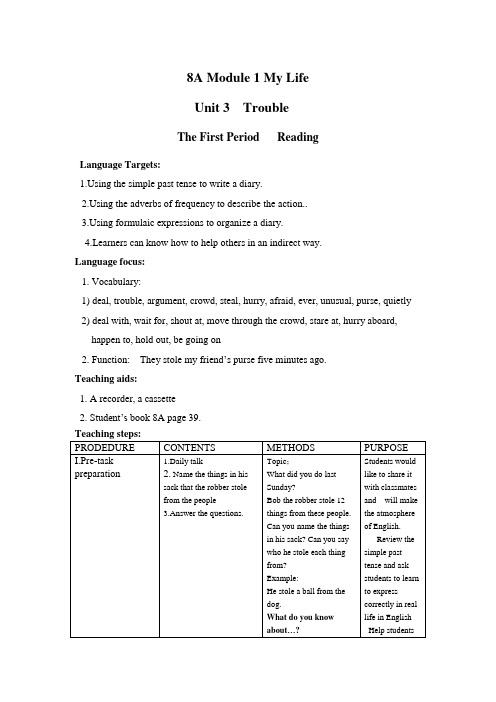
8A Module 1 My LifeUnit 3 TroubleThe First Period ReadingLanguage Targets:ing the simple past tense to write a diary.ing the adverbs of frequency to describe the action..ing formulaic expressions to organize a diary.4.Learners can know how to help others in an indirect way.Language focus:1. Vocabulary:1) deal, trouble, argument, crowd, steal, hurry, afraid, ever, unusual, purse, quietly2) deal with, wait for, shout at, move through the crowd, stare at, hurry aboard,happen to, hold out, be going on2. Function: They stole my friend’s purse five minutes ago.Teaching aids:1. A recorder, a cassette2. S tudent’s book 8A page 39.Second Period Grammar A Language Targets:1. Practise the simple past tense and adverbial expression.2. Students can use the simple past tense correctly.Language focus:1. Vocabulary: jump over a stream, blow down your tents, carry guns2. Forms of the simple past tense of irregular verbs.Teaching aids:1. A recorder, a cassette,2. Students’ book 8A page 42Teaching steps:Third Period Grammar BLanguage Targets:1.To use the adverbial phrases of time with the simple past tense to show whensomething happened.2.Students can use the simple past tense correctly.Language focus:1. Vocabulary: jump over a stream, blow down your tents, carry guns2. Forms of the simple past tense of irregular verbs.Teaching aids:1. A recorder, a cassette,2. Students’ book 8A page 43Teaching steps:Fourth Period Listening Language Targets:1. To learn to catch the main information you need while listening.2.To describe a person’s appearance correctly. Language focus:1.Vocabulary: description, rather, baseball2. Functions: It was black and brown in color..He had quite long hair.Teaching aids:1. A recorder, a cassette,2. Students’ book 8A page 45 Teaching steps:The Fifth Period Speaking Language Targets:1. Learn three pronunciations related to the past tense forms of verbs.2. Be able to say the sentences with correct intonation .3. Introduce a historical figure usinthe grammar learnt in this unit.Language focus and difficult points:1. Three different ways of pronouncing the past tense forms of verbs.2. Vocabulary: mend downstairs India press the buttonTeaching Aids:1. Student’s Book 8A page 46.2. Multi-mediaThe Sixth Period Writing Language Targets:1. To finish Judy’s diary by using correct verbs and other words.2. To use the simple past tense to write a diary.3. To express their own ideas in English fluently.Language focus and difficult points:1.The simple present tense.2. Vocabulary: helicopter, out of, up to, climb upTeaching Aids:1. Student’s Book 8A page 472. Multi-mediaThe Seventh Period More PracticeLanguage Targets:1. To learn some funny side of police work.2. To be able to collect information and find the imformation about funny side of police work. around you.3.To express their ideas in English fluently.Language focus and difficult points:Vocabulary: admit, arrest, case, customs, rare, refund, release, smuggle, teller Teaching Aids:1. Student’s Book 8A page482. Multi-media。
牛津8A unit1(3)英语课件PPT

May is a _t_r_u_e_ friend because when the writer feels _w__o_rr_ie_sabout something, she can always _g_o_ _t_o_ May. She can _k_e_e_p_ _a_ _s_e_cr_e_t so the writer tells her _a_n_y_t_h_in_g. May is also very __k_i_n_d and never says _a__ __b_a_d_ __w__o_rd_ ___a_b_o_u_t __a_n_y_o_n.e
legs and they do not __fi_t _ the school desks. He often kn_o_c_k_s_o_v_e_rbooks and pens when he _w_a_l_k_s _p_a_stthe
desks. He is __f_u_n_n_y_.
The writer _th_o_u_g_h_t__o_f_ her good friend May when read the a_d_v_e_r_ti_s_e_m_e_n_t.May is _s_h_o_rt__ and has _s_tr_a_i_g_h_t , __S_h_o_u_ld_e_r_-_le_n_g_t_h_ hair.She looks _p_r_et_t_y_.
The first article _te_l_ls___ us a_b_o_u_t_ Betty. She is
_as__ _s_li_m__ _as___ the write is. She hass_h_o_r_t _h_a_ir__. They have been best friends f_o_r__a___lo_n_g__t_im__e_.
上海版牛津八年级第一学期知识点总结 unit 3 词性转换,重点短语,重点句型
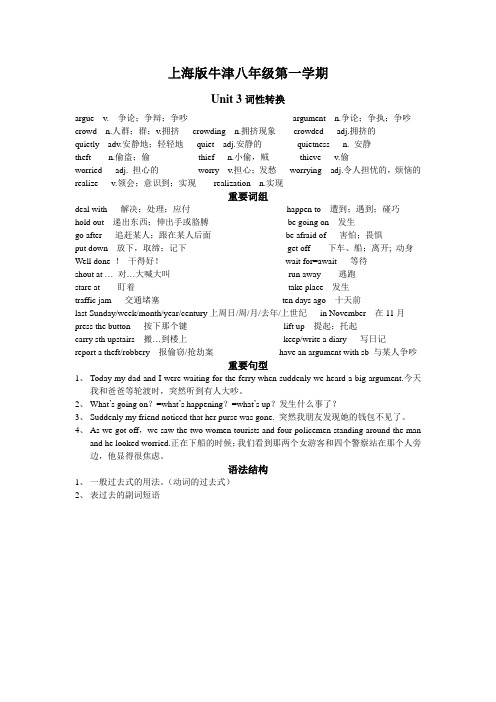
上海版牛津八年级第一学期Unit 3词性转换argue v. 争论;争辩;争吵argument n.争论;争执;争吵crowd n.人群;群;v.拥挤crowding n.拥挤现象crowded adj.拥挤的quietly adv.安静地;轻轻地quiet adj.安静的quietness n. 安静theft n.偷盗;偷thief n.小偷,贼thieve v.偷worried adj. 担心的worry v.担心;发愁worrying adj.令人担忧的,烦恼的realize v.领会;意识到;实现realization n.实现重要词组deal with 解决;处理;应付happen to 遭到;遇到;碰巧hold out 递出东西;伸出手或胳膊be going on 发生go after 追赶某人;跟在某人后面be afraid of 害怕;畏惧put down 放下,取缔;记下get off 下车、船;离开; 动身Well done !干得好!wait for=await 等待shout at …对…大喊大叫run away 逃跑stare at 盯着take place 发生traffic jam 交通堵塞ten days ago 十天前last Sunday/week/month/year/century上周日/周/月/去年/上世纪in November 在11月press the button 按下那个键lift up 提起;托起carry sth upstairs 搬…到楼上keep/write a diary 写日记report a theft/robbery 报偷窃/抢劫案have an argument with sb 与某人争吵重要句型1、Today my dad and I were waiting for the ferry when suddenly we heard a big argument.今天我和爸爸等轮渡时,突然听到有人大吵。
牛津上海版8AU3

For personal use only in study and research; not forc o m m e r c i a l u s eM o d u l e1U n i t3D e a l i n g w i t h t r o u b l e知识目标:学习课文中重点词、词组、句型和语法。
能力目标:掌握英语日记格式和地址写法。
情感目标:教育学生遇到突发事件,要沉着冷静,有勇有谋。
教学重点:核心词汇argue (v )争吵,争论 empty (a.) 空的crowd (n) 人群 stare (n)&(v) 瞪视,盯着看notice (v) 注意到 follow (v) 跟从,跟随action (n) 行为,举动 report (v)&(n) 报道,报告dial (v) 拨号 rob (v) 抢劫detail (n) 细节 steal (v) 偷 (steal---stole—stolen) 教学难点:1. 不规则动词的拼写,一般过去时的助动词did 的运用. 表示过去的时间短语 last, ago2. 独立完成自己的日记。
课前导学:单词和短语:1.____________ 穿过,贯穿prep.2.____________偷,偷窃,盗窃罪n.3.____________担心的,发愁的adj.4.____________________怎样解决,处理,应付5.____________________ 遭到,遇到6.____________________ 给更多的细节7.____________________ 两位女游客8.____________________ 递出东西,伸出手9.____________________ 一件不同寻常的事情10.____________________ 发生什么事了?11.____________________抢某人东西12.____________________拨(电话号码) v.13.____________________ 报告一起盗窃案14.____________________ 下车/船、飞机15.____________________ 盯着看;凝视16.____________________ 在。
牛津英语8a辅导练习三units1-3强化训练
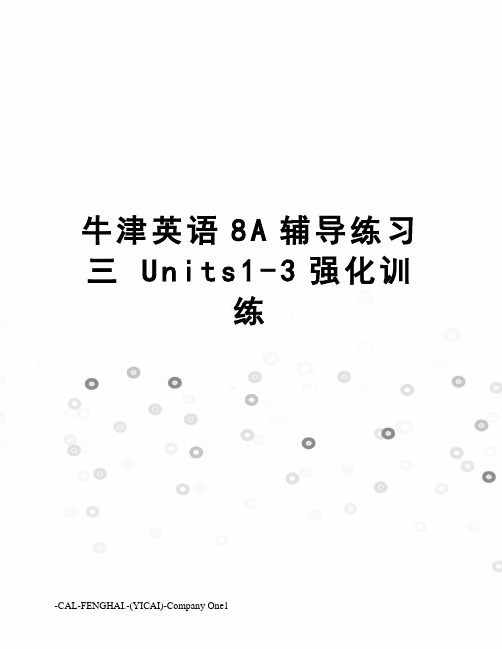
牛津英语8A辅导练习三U n i t s1-3强化训练-CAL-FENGHAI.-(YICAI)-Company One1十班博亚辅导练习(五) 8A Units 1-3 单元巩固复习一.根据句意或首字母填空:1. Little Kitty likes hiding ________ (her) behind the door to frighten her friends.2. He got a ___________ (bad) result in English this term than last term, he didn’t try his best.3. He does well in his geography, so he can answer the teacher’s questions _________ (correct).4. --- Who is your __________ (close) person in your family? --- My grandmother is.5. We can learn a lot from ___________ (hero).6. It's ___________ (必要的) for us to learn English well.7. Don’t leave the child ____________ (单独的) near the river. It’s dangerous.8. He can’t ____________(解答) the problem at all.9. He __________(重复) his words again and again so that he could make himself understood.10. The Greens will have a _________ (令人愉快的) trip because they plan everything carefully.11.A my is always c__________ and she often jumps and sings on the way back home.12.T hey say a computer will be as small as your hand in the near f_______. Do you believe that?13.14.H e is always so n____________ during the plane trip that he never falls asleep.15.W hat is the h__________ of the mountain? Is it 1200 meters?16.Y ou will soon find English a very useful l___________ if you travel a lot.17.T hese pancakes made by my mother are really __________. (taste)18.T he real _________ of the match were our players. (hero)19.H e is a man of many ___________. (able)20.T he child was ____________ in his tight boots. (comfortable)21.H e looks much ___________ than before. (thin)二.动词填空:1.My parents never agreed ____________ (invite) my classmates to our home.2.Do they often have a nice time ____________ (walk) in the park nearby?3.When something ____________ (worry) my uncle, he always has a drink of wine in a bar.4.Don’t you think ____________ (ski) is as dangerous as skating?5.6.Everybody here _____________ (be) very happy if he can pass the Mid-term exam.7.I don’t know how ____________ (solve) the maths problem. Can you help me?8.9.Look! How happily the children ____________ (play) hide-and-seek over there!10.S hall we __________ (plan) a day out for ourselves on Sunday?11.O ur sports meeting ___________ (take) place on the second Saturday of October every year.11.Y our brother ___________ (practice) dancing tomorrow morning, isn’t he?12.13.S hould Daniel _________ (clean) the fish tank three times a week?14.15.L ook, some of the students __________ (have) comic books in their hands.16.T here ___________ (be) a football match in our school next week, isn’t there?17.18.B e quick! Our teacher ___________ (wait) for us to help him.19.I’m surprised to hear that she __________ (hurt) her leg carelessly yesterday.20.P E teachers teach students how ___________ (jump) farther than before..21.M rs Green with her two daughters always _________ (try) different kinds of food on Sundays.22.___________ (not play) tricks on those people in trouble.23.P eople are trying to find ways of ___________ (put) out the big fire..24.D o you think fantail goldfish are difficult _________ (look) after25.I don’t think so三.句子翻译1. 她总是乐意与我分享她的秘密。
Unit+3+教案 牛津上海版八年级英语上册
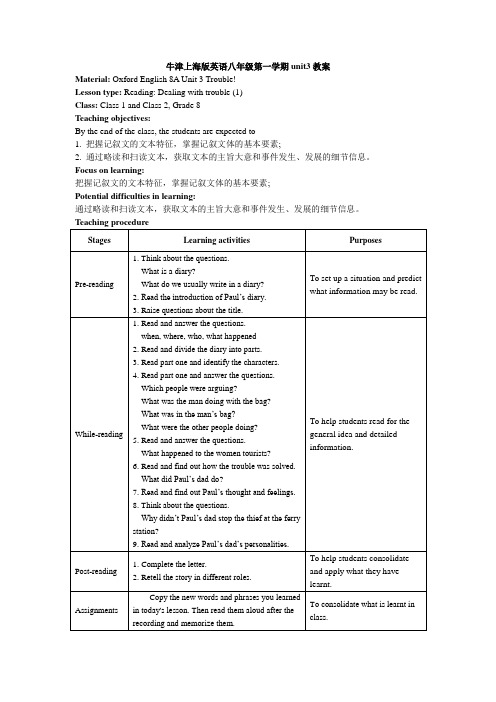
牛津上海版英语八年级第一学期unit3教案Material: Oxford English 8A Unit 3 Trouble!Lesson type: Reading: Dealing with trouble (1)Class: Class 1 and Class 2, Grade 8Teaching objectives:By the end of the class, the students are expected to1. 把握记叙文的文本特征,掌握记叙文体的基本要素;2. 通过略读和扫读文本,获取文本的主旨大意和事件发生、发展的细节信息。
Focus on learning:把握记叙文的文本特征,掌握记叙文体的基本要素;Potential difficulties in learning:通过略读和扫读文本,获取文本的主旨大意和事件发生、发展的细节信息。
Stages Learning activities PurposesPre-reading 1. Think about the questions.What is a diary?What do we usually write in a diary?2. Read the introduction of Paul’s diary.3. Raise questions about the title.To set up a situation and predictwhat information may be read.While-reading 1. Read and answer the questions.when, where, who, what happened2. Read and divide the diary into parts.3. Read part one and identify the characters.4. Read part one and answer the questions.Which people were arguing?What was the man doing with the bag?What was in the man’s bag?What were the other people doing?5. Read and answer the questions.What happened to the women tourists?6. Read and find out how the trouble was solved.What did Paul’s dad do?7. Read and find out Paul’s thought and feelings.8. Think about the questions.Why didn’t Paul’s dad stop the thief at the ferrystation?9. Read and analyze Paul’s dad’s personalities.To help students read for thegeneral idea and detailedinformation.Post-reading 1. Complete the letter.2. Retell the story in different roles.To help students consolidateand apply what they havelearnt.AssignmentsCopy the new words and phrases you learnedin today's lesson. Then read them aloud after therecording and memorize them.To consolidate what is learnt inclass.Read Paul's diary again and completeExercises C1, C2 and D2 on pages 40 and 41,Student's Book.Material: Oxford English 8A Unit 3 Trouble!Lesson type: Reading: Dealing with trouble (1)Class: Class 1 and Class 2, Grade 8Teaching objectives:By the end of the class, the students are expected to1. 通过文本分析,掌握日记文本的文本特征和写作方法;2. 通过研读文本,联系生活实际,学会理智、安全地处理生活中遇到的麻烦。
英语沪教牛津版八上unit 3

2.不规则变化: good → better → best many→more→most much→more→most bad→worse→worst little→less → least ill→ worse→worst far→farther(further) → farthest(furthest) 3.adj. 前加less和least表示“较不”和“最不” important 重要 less important 较不重要 least important 最不重要
than后的人称代词用主格还是宾格? 一、当句中动词为不及物动词或动词的宾语是物时, than后的人 称代词既可以用主格, 也可以用宾格, 意思不变。 e.g. Tom runs much faster than I /me. She speaks English better than he /him. 注意: 如果在than后保留动词的话, than后用主格。 e.g. Tom runs much faster than I do. She speaks English better than he does. 二、当句中动词的宾语指人时, than后用主格或宾格, 意思有区别。 E.g. 1. She knows me better than he. Vs 2. She knows me better than him. 第1个完整句: She knows me better than he knows me 第2个完整句: She knows me better than she knows him. 注意: 在遇到you时, 句子不能省略了, 否则会产生歧义。 e.g. She knows me better than you. 既可理解为: She knows me better than you do. 也可理解为: She knows me better than she knowsdepend on 依靠;取决于 dependent adj. 依靠的,依赖的 be dependent on 依赖于… independent adj. 独立的 e.g. Are you an independent person?
上海牛津英语初中8A Unit3单词教学
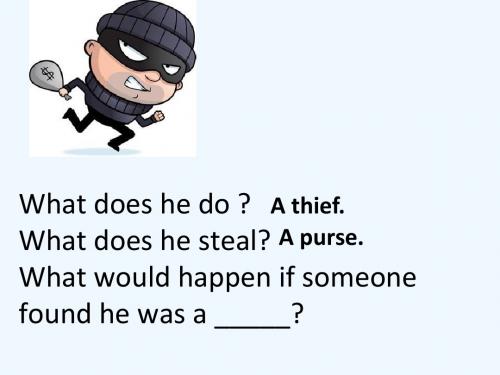
3-2
B Match the paragraphs with their main ideas. Paul’s father spoke to one of the women. She said the man and two other men had stolen her friend’s purse. The people got onto the ferry, but Paul’s father wouldn’t get on. Paul couldn’t understand why. Paul describes how he and his father saw a man and two women arguing at the ferry. His father quickly phoned the police with all the details. The police met the ferry when it arrived and caught the man.
2.Which people are arguing?
3.What are the other people doing?
Look and choose
b
1 A: Why was the man holding out a bag? B: To show that he did not have_________ a. any money b. the woman's purse c. any food
argue quietly strange deal with afraid of stare at realize notice Worried notice
- 1、下载文档前请自行甄别文档内容的完整性,平台不提供额外的编辑、内容补充、找答案等附加服务。
- 2、"仅部分预览"的文档,不可在线预览部分如存在完整性等问题,可反馈申请退款(可完整预览的文档不适用该条件!)。
- 3、如文档侵犯您的权益,请联系客服反馈,我们会尽快为您处理(人工客服工作时间:9:00-18:30)。
8A Module 1 My LifeUnit 3 TroubleThe First Period ReadingLanguage Targets:ing the simple past tense to write a diary.ing the adverbs of frequency to describe the action..ing formulaic expressions to organize a diary.4.Learners can know how to help others in an indirect way.Language focus:1. V ocabulary:1) deal, trouble, argument, crowd, steal, hurry, afraid, ever, unusual, purse, quietly2) deal with, wait for, shout at, move through the crowd, stare at, hurry aboard,happen to, hold out, be going on2. Function: They stole my friend’s purse five minutes ago.Teaching aids:1. A recorder, a cassette2. S tudent’s book 8A page 39.Teaching steps:PRODEDURE CONTENTS METHODS PURPOSEI.Pre-taskpreparation1.Daily talk the things in hissack that the robber stolefrom the people Topic;What did you do lastSunday?Bob the robber stole 12things from these people.Can you name the thingsin his sack? Can you saywho he stole each thingfrom?Example:He stole a ball from thedog.Students wouldlike to share itwith classmatesand will makethe atmosphereof English.Review thesimple pasttense and askstudents tolearn to expresscorrectly in real3.Answer the questions.What do you knowabout…?1.Have you ever been ona ferry?2.What number do youdial to call the police?3.What is a diary?4.Do you keep a diary?5.What do you usually6.write in your diary?7.How often do youwrite? life in EnglishHelp students know something about diaries.II. While- task procedure 1. Read the title and theintroduction on the nextpage.Topic: Dealing withtroubleIntroduction: Here is apage from Paul’s diary.Paul is writing about anunusual thing thathappened to him one day.2、Learn the new words.3、Learn the article.Tell Ss to look at thetitle, subtitle andpictures before theyread the wholearticle, they can get ageneral idea of thetopic.Give a short answer tothe question below.1.What do you thinkPaul will write about?2.What is the mandoing with the bag?3.Which person isPaul?Ask Ss to read thetext by themselvesand find out the newwords, and try toguess the meaningsby reading the wordsaround them.1.Read the text afterthe tape.2..Read the texttogether.3. Match the paragraphswith their main ideas.Help Ssunderstandthe articleeasily.This is part ofthe skill ofpredicting, Itis good for Ssto makeintelligentguesses aboutwhat mightbe in thearticle.Develop theskill ofguessing andworking outthe likelymeaning of aword fromthe study ofits context.Check theunderstanding of the text.4. Look and think5. Exercises D1: Help Paul to complete the letter to Kurt.6. Exercise D2: Find the facts 1. Read the texttogether.2. Ask students tofinish exercises C1,C2, C3.3.Have a check.4.Work in pairs. Askand answer about Paul’sdiary. S1 asks thequestions and S2 tries toanswer his or herquestions.Later, Paul wrote a letterto his penfriend, Kurt.Some words are missingfrom his letter. Useinformation from Paul’sdiary to complete theletter. Put one word ineach blank.Work alone or in pairs.Read Paul’s diary againto find the answers tothese questions..Train the Ss’reading skills.The exercisepracticesusingdifferentforms of thesimple pasttense.III. Post-task activity 1. Retell the story. Suppose you arePaul’s father. Retellthe story.To reviewwhat theyhave learnedIV. Assignment Read and copy the newwords.Workbook 8A, pages11, 12, 18, 19 and 20. Go over the knowledge they have learned.教学反思:Second Period Grammar ALanguage Targets:1. Practise the simple past tense and adverbial expression.2. Students can use the simple past tense correctly.Language focus:1. V ocabulary: jump over a stream, blow down your tents, carry guns2. Forms of the simple past tense of irregular verbs.Teaching aids:1. A recorder, a cassette,2. Students’ book 8A page 42Teaching steps:PRODEDURE CONTENTS METHODS PURPOSEI.Pre-taskpreparationDaily talk Topic: A storyhappened on the bus Let students become interested in this topic and make the atmosphere of English.II. While- taskprocedure1.Introduce when touse the simple pasttense.2.The different formsof the past tense verbs. 1. Ask Ss when weshould use the simplepresent tense.We can use thesimple past tense torefer to things thathappened in the past.Here are somecommon time expressions, e.g., aminute ago,yesterday, lastweek/month/year.1.Regular verbs:1).We add -ed to thepast form of mostregular verbs inpositive sentences.Revise thebasic use ofthe simplepast tense.Let thestudentsremember therules and3.Practise4..Forms of the simple past tense. 2).We only add -d toverbs that end in –e.3).We change the -yto-i and add -ed tosome of the verbs thatend in–y.4).Some verbs doubletheir final consonantswhen -ed is added,Write the past formsof the given verbs.Tips:Verbs ending in avowel + y form thesimple past tense byadding ‘-ed’, e.g.,enjoy ed, stay ed.We form the simplepast tense of irregularverbs differently. Wedo not add ‘-ed’.We use the simplepast tense to makepositive and negativesentences like this.We can use thesimple past tense toask and answerquestions like this.Structuree.g.I heard the argument.I didn’t hear theargument.Did you hear theargument?Yes, I did.No, I didn’t.Tips:The simple pasttense is the same forall persons.make sure Ssunderstandthem.Help thestudents toremember thetips.Tell thestudents weuse thesimple pasttense to talkabout thingswe used todo.5. Language Exercises Complete their conversation.plete their dialogue by writing the verbs in brackets in the past simple tense. Later, Paul told hisfriend Julia about thetheft. Here are someof Julia’s questionsand Paul’s answers.Put one or morewords in each blank.The first one has beendone for you.1、Last month, Leowent on a schoolcampingtrip. Now, he isshowing Ling somephotos. Work in pairsand role-play Leo andLing. Complete theirdialogue by writingthe verbs in bracketsin the past simpletense.2、Work in pairs. S1is a police inspector.S2 saw a robbery inthe Pizza Palace. S1asks about therobbery with theverbs in brackets. S2uses the pictures andthe words given toanswer S1’squestions.Examinewhether Sshave graspedthe simplepast tense.Train thestudents’speakingability.III. Post-taskactivityComplete thenewspaper report. Work alone tocomplete thenewspaperreport below. Use thequestions andanswers you gave inC1.Work alone or inpairs to complete theTo reviewwhat theyhave learnednewspaper report below. Use the correct form of the verbs in brackets.IV. Assignment Workbook 8A, pages23, 24, 25 and 26. Go over the knowledge they have learned.教学反思:Third Period Grammar BLanguage Targets:1.To use the adverbial phrases of time with the simple past tense to show whensomething happened.2.Students can use the simple past tense correctly.Language focus:1. V ocabulary: jump over a stream, blow down your tents, carry guns2. Forms of the simple past tense of irregular verbs.Teaching aids:1. A recorder, a cassette,2. Students’ book 8A page 43Teaching steps:PRODEDURE CONTENTS METHODS PURPOSEI.Pre-task preparation Daily talk Topic:On my way to schoolGet studentsinterested in thetopicII. While- task procedure1.Introduction: theadverbial phrases oftime in the simple pasttense. We can use theadverbial phrases oftime with the simplepast tense to showwhen somethinghappened.ing lastThe word last refersto the week, month,year, etc. before thepresent one.3. Using in, on or atwith time.4. Using ago.5.Practise asking andansweringWrite down theadverbial phrases oftime in the simplepast tenseLast month,On Saturday,In 2005,Ten days agoAdverbial phrasescan go after or beforethe main clause.Tips:We don’t say ‘lastmorning/afternoon/evening’, but ‘yesterdaymorning/afternoon/evening’.We use in, on or atwith time phrases.Read the followingexamples.We do not use in, onor at before thesewords: every lastnext this tomorrowyesterdayThe word ago refersto a period of timebefore now. It alwayscomes after the timeword(s).Look at this time-lineand read thequestions. Answerquestions 3 and 4.Then in pairs,practise asking andanswering six moreHelp Ss usethe adverbsand adverbialphrasescorrectly.plete Paul’s diary by using the correct adverbial phrases. questions like these.Last Wednesday,what was the date?What was the day sixdays ago?What was the datetwo days ago?What was the dayfour days ago?Paul is reading hisdiary. It is now 9 p.m.on30 June. CompletePaul’s thoughts byusing the correctadverbial phrases.The first one has beendone for you.Examinewhether Sshave graspedtthe adverbialphrases oftime of thesimple pasttense.III. Post-task activity 1.Additional exercises.Use the simple pasttense to describe whatstudents did at the pasttimes.1.Write the followingadverbial phrases onthe board.two hours agoyesterday last weekone month ago2.Ask the students towrite what they did atthose times.To reviewwhat theyhave learnedIV. Assignment Workbook 8A, pages26 and 27. Go over the knowledge they have learned.教学反思:Fourth Period ListeningLanguage Targets:1. To learn to catch the main information you need while listening.2.To describe a person’s appearance correctly.Language focus:1.V ocabulary: description, rather, baseball2. Functions: It was black and brown in color..He had quite long hair.Teaching aids:1. A recorder, a cassette,2. Students’ book 8A page 45Teaching steps:PRODEDURE CONTENTS METHODS PURPOSE I.Pre-taskpreparation1.Look at the picturreand answer thequestion.2.Review how todescribe a person’sappearance. Question:Who is the man in thepicture?1.Do you stillremember what youlearned in theLISTENING sectionin Unit 1? When wedescribe a person’s appearance, what dowe usually talkabout?hair colour, hairlength, hair style,clothes…2.Now, pretend thatyou are Simon. Youare telling the policeabout the thief. Thinkabout what you willprobably say.To motivatethe students’interest byguessing thepictures.Help studentsto know howto describe aperson’sappearance.II. While- taskprocedure1. Listen to therecording. Completesome notes ofdescriptions of theother two thieves.2. Find the two thievesin the line of peoplebelow according to thedescriptions. 1.Now you are goingto complete somenotes of descriptionsof the other twothieves. What shouldyou do when youneed to complete thenotes of descriptionsof people?2.Listen to therecording. You willhear one of thewomen, from thestory on page 39,talking to a policeman. She isdescribing the twoother thieves. Listencarefully andcomplete thedescriptions below bywriting one word ineach blank.Thief A: Thief B:Age:Height:Build:Hair:Clothes:Shoes:Now use thedescriptions in A tohelp you find the twothieves in the line ofpeople below. Circlethe correct numbers.Let studentslearn to takenotes whilelistening.Develop thestudents’listeningskill.III. Post-task activity Work in pairs. S1describes one of the To motivate1.Finds out the suspect.2.Describe one of the your classmates. other suspects and S2takes down the notesand finds out thesuspect.Now, describe one ofthe your classmates,then let others guesswho he or she is.th e students’interest byguessing thepictures.IV. Assignment Workbook 8A, page27. Go over the knowledge they have learned.教学反思:The Fifth Period Speaking Language Targets:1. Learn three pronunciations related to the past tense forms of verbs.2. Be able to say the sentences with correct intonation .3. Introduce a historical figure usinthe grammar learnt in this unit. Language focus and difficult points:1. Three different ways of pronouncing the past tense forms of verbs.2. Vocabulary: mend downstairs India press the buttonTeaching Aids:1. Student’s Book 8A page 46.2. Multi-mediaPROCEDURE CONTENTS METHODS PURPOSEI.Pre-taskpreparation RevisionReview three forms of thesimple past tense of regularverbsHelp students to learnthe following better.II.While-taskprocedureA: Talk timeA1. /t/, /d/ or/Id/Read and compareA2: Read thesentencescorrectly. There are three different waysof pronouncing the past tenseforms of verbs.Practise saying the followingverbs. Try to say the endingscorrectly./t/ crossed helped laughedpressed asked/d/ agreed realized carriedturned used/Id/ ended needed startedlifted visitedTips:When the verb ends in a/t/ or /d/ sound, the /Id/sound is added as an extrasyllable.1、Listen to some verbs in theirpast forms.Write them in thecorrect columns.2、Summary.Show the rules for pronouncingsimple past (and past participle)endings.3、Pronounce the endings ofthese words. Write /t/, /d/ or /Id/in the blanks.1listen ed__________2like d__________3want ed__________4hope d__________5start ed__________6chatt ed__________7finish ed__________8organize d__________9stopp ed__________10raise d__________11walk ed__________12turn ed__________4.Listen and say theseStudents practisespeaking skills andlearn more skills ofspeakingA3. Work in pairs sentences.She pressed the button.She lifted it up.She carried it downstairs.1.Write the examples on theboard:Did she switch it on?↗Yes, she switched it on.↘2.Ask Ss to repeat them.3.Tell Ss to make their voicerise of the end of the questionsand fall at the end of theanswers.Let the students usethe rising and fallingintonation correctly.III.Post-task activities B.Speak up 1.Imagine you are a famousperson in history. Say four orfive sentences about yourself tothe class but do not tell yourname. After you have finishedspeaking, ask the class to guessyour name. Use the clues belowto help you.2. Ask the class to guess yourname.Ss practice speakingEnglish and it canarouse their interest.教学反思:The Sixth Period Writing Language Targets:1. To finish Judy’s diary by using correct verbs and other words.2. To use the simple past tense to write a diary.3. To express their own ideas in English fluently.Language focus and difficult points:1.The simple present tense.2. Vocabulary: helicopter, out of, up to, climb upTeaching Aids:1. Student’s Book 8A page 472. Multi-mediaPROCEDURE CONTENTS METHODS PURPOSEI.Pre-taskpreparation1、Daily talk2. Have adiscussion.3.Learn howto writediaries.Talk about what you sawyesterday.Read Paul’s diary on page 39again. The introduction sectionsays that Paul is writing about anunusual thing that happened tohim one day.Discuss:What is the unusual thing?We are going to learn to writediaries in this lesson. Can youanswer the following questionsabout diaries?1.What is a diary?2.What do people usually write intheir diaries?3.What tense do people usuallyuse when writing a diary?Review the simple pasttense and practise thestudents’speakingability.Let the studentsexpress their own ideasin English.Help students learnmore about writingdiaries.II.While-task procedure 1. Look at thepicture andanswer thequestions2. Completethe sentencesby using thepictures andthe words inBefore we write our own diaries,we are going to complete anentry from Judy’s diary. Look atthe picture on the right andanswer the two questions below.1.Who came in the morning?2.What did he give to Judy?Now you are Judy. Every day youwrite a diary. Yesterday was yourbirthday, and you saw a robbery.Work in pairs. Complete thesentences by using the picturesLearn to write somesentences by usingsome key words withthe boxes. and the words in the boxes.Remember to put the verbs intothe simple past tense.Work alone complete Judy’sdiary entry for yesterday.Ask Sswhat Judy did in each picture,meanwhile, read the words in thebox on page 45.the help of the pictures.III.Post-task activities 1.Work alone tocomplete Judy’sdiary entry foryesterday.2.Studentswork on theirown to writetheirdiaries..Look at Judy’s diary andcomplete the table1、What happened to you last Sunday?Use the questions to help you. Thenwrite your own diary. Remember touse the simple past tense.What was the date last Sunday?In the morning…At noon…In the afternoon…In the evening…2、Read it to the partner after havingfinished. Then ask him/her to correctit.Students will practisewriting skills bylearning how to makean article betterTrain the Ss’ writingskills and practisethe simple pasttense.V. Assignment Workbook 8A, pages 29 and 30.教学反思:The Seventh Period More PracticeLanguage Targets:1. To learn some funny side of police work.2. To be able to collect information and find the imformation about funny side of police work. around you.3.To express their ideas in English fluently.Language focus and difficult points:V ocabulary: admit, arrest, case, customs, rare, refund, release, smuggle, teller Teaching Aids:1. Student’s Book 8A page482. Multi-mediaTeaching steps:PRODEDURE CONTENTS METHODS PURPOSE I.Pre-taskpreparation 1、Learn some newwords about criminals. A.These people are allcriminals. Match thenames with the crimes inthe pictures Use adictionary if necessary.Studentswill know moreabout thecriminals. Itwill make thestudentsbecomeinterested in thelearning.II. While- task procedure 1.Show the introduction,the title and the pictures,Title:The funny side ofpolice workThe introduction:Paulawanted to write an articleabout the funny side ofpolice work for her schoolnewspaper. Sheinterviewed DetectiveSmith and he told herthese stories.1、Try to answer thesequestions.Who told these stories?What is his job?2、Explain what the titlemeans.Think: What do youthink these stories willbe about?Try toarouse thestudents’interest ofspeakingEnglish.2.Listen and read the stories.3.Look quickly through the three stories onpage 48 again to find answers to these questions.4.Answer these questions. 1、Find these words inthe passage and work outtheir meanings.customs releasedsmuggle tellerrefund rare2、Use the followingwords to complete thesesentences.The words should havethe same meanings asthose in brackets.Write the correct letterfor each story in theblanks.In which story (A, B, orC) did ...1).some birds sing asong?Story _______2)a robber give a tellerhis address?Story _______3).the police arrest aman by mistake?Story _______In Story A, why didDetective Smith arrestthe man?In Story B, where did theman go after therobbery?In Story C, what do youthink happened after thebirds started to sing?Help thestudents tounderstandthe newwords better.Check howmuch thestudentsunderstandthe funnyside of policework.III. Post-taskactivity Have a discussion. 1.What do you thinkof police work?2.Tell us some funnyside of police workTo showstudents’ownideas aboutfunny side ofyou have known. police work. IV. Assignment Retell the stories. Go over theknowledgethey havelearned.教学反思:。
